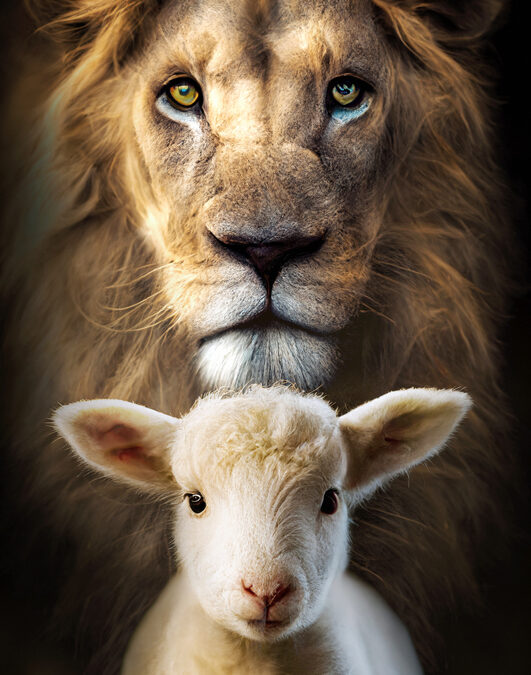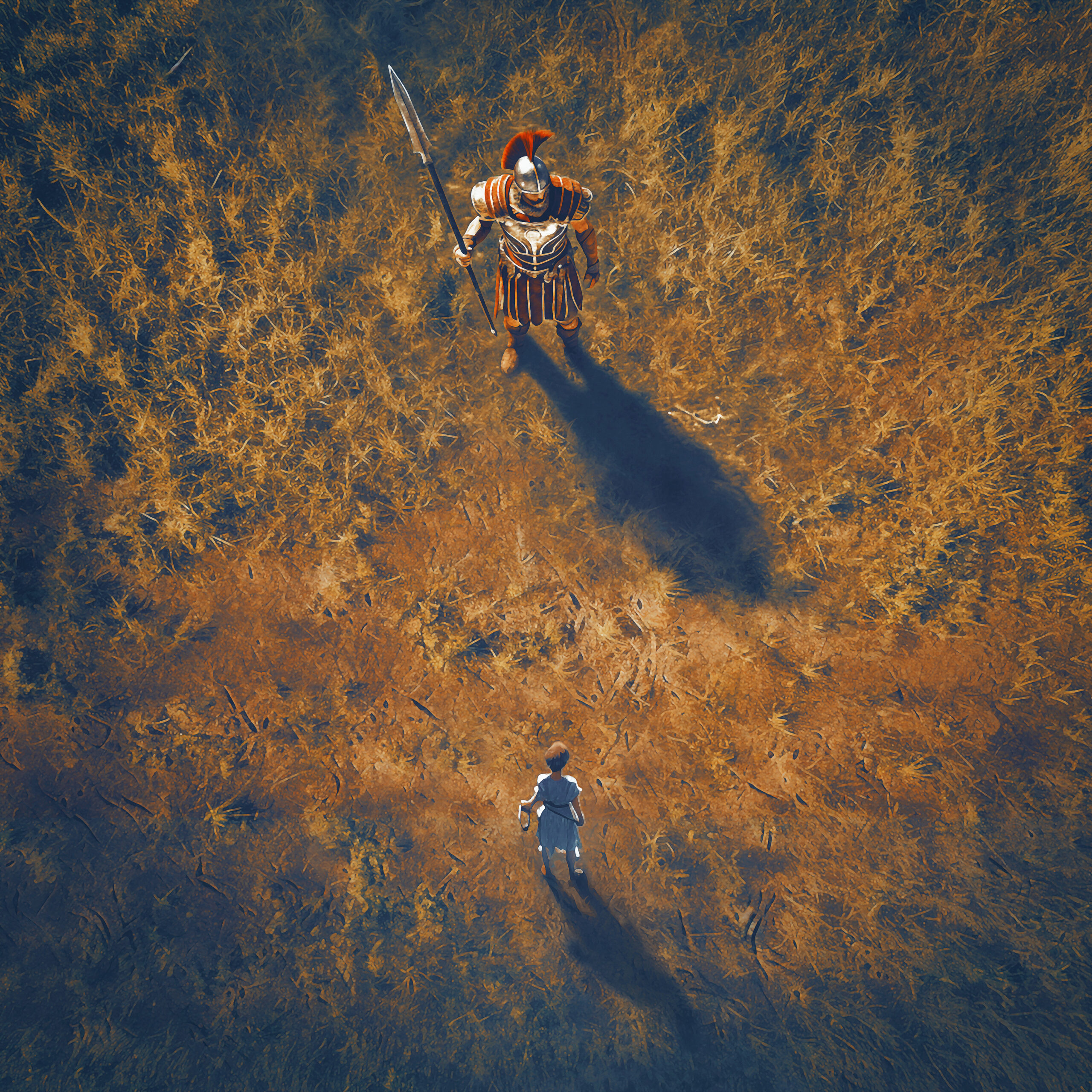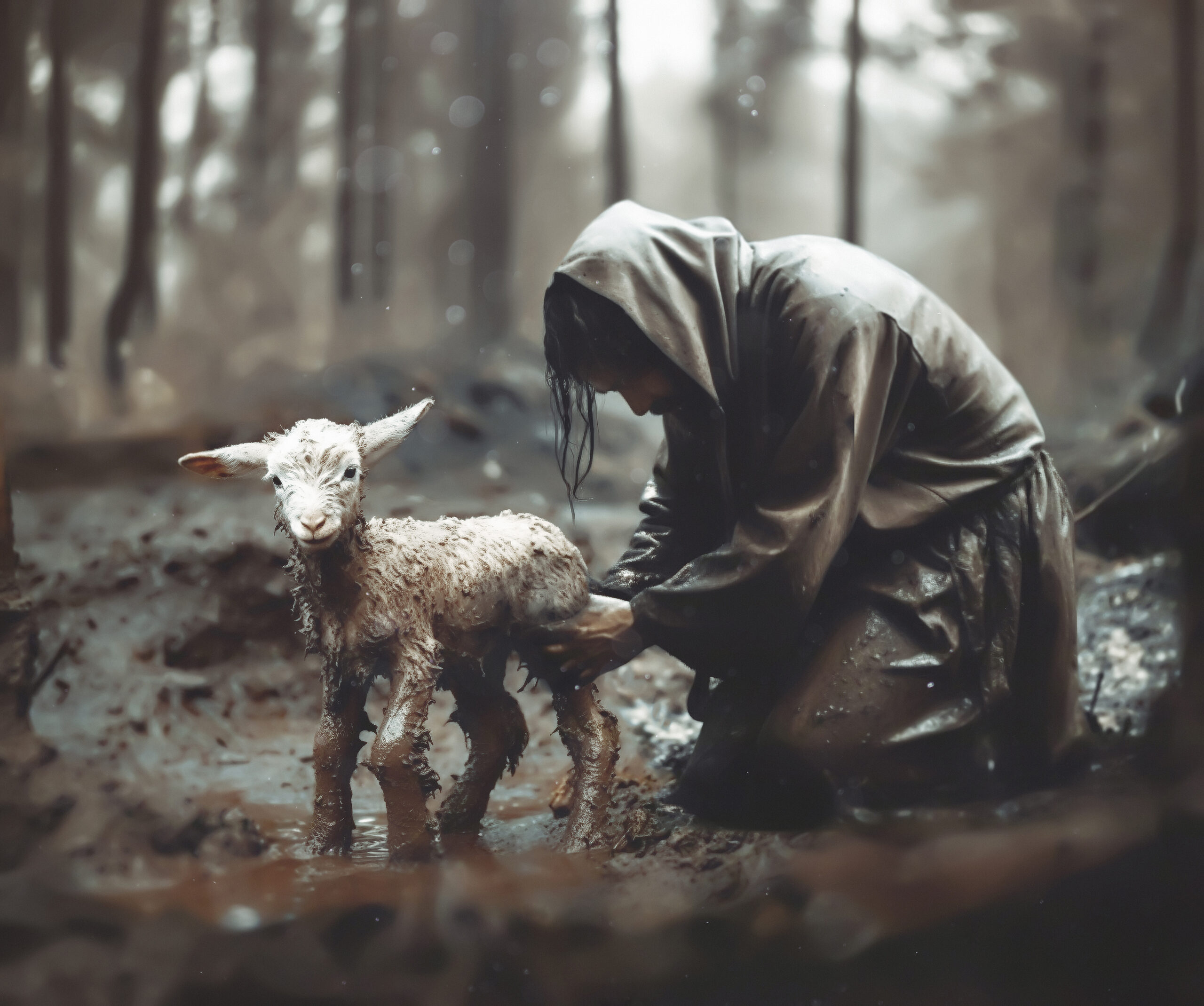
by Danny Eley | Jul 29, 2023 | Faith, Front Page
Life is a constant balancing act, especially when it comes to embodying the Christian values of manhood. One moment, we are called to be bold and fierce like a lion, and the next, we are required to display the humble, sacrificial spirit of a lamb. Such is the nature of life’s dualities, and such is the symbolic depth of the Bible.
In the Bible, the lion and the lamb are recurring metaphors used to portray the complex nature of God and His relationship with His people. These two seemingly opposing figures represent dual aspects that, when taken together, form a holistic and balanced perspective on Christian manhood. Let’s delve into the biblical basis of these symbols, and understand their profound implications for us, modern-day men.
The Lion – King of the Jungle and of Judah:
The lion, referred to as the “King of the Jungle,” represents strength, courage, authority, and justice. In the Bible, the lion symbolizes God’s power and majesty. Revelation 5:5 refers to Jesus as the “Lion of the Tribe of Judah,” emphasizing His royal authority and victorious nature. For men striving to align themselves with the lion’s characteristics, the challenge lies in exercising power with wisdom, leading with justice, and standing against the wrong with unflinching courage.
The Lamb – Symbol of Sacrifice and Servanthood:
On the flip side, the lamb symbolizes gentleness, humility, and sacrifice. It stands for the submissive and sacrificial nature of Christ. In John 1:29, John the Baptist refers to Jesus as the “Lamb of God,” who takes away the sin of the world. The lamb symbol encourages men to embody humility, show mercy, serve others selflessly, and even make personal sacrifices for the greater good.
Balancing the Lion and the Lamb:
The coexistence of the lion and the lamb within us reflects the divine balance that the Bible teaches. It teaches us to be strong yet humble, assertive yet compassionate, powerful yet understanding. We, as men, are called upon to be strong and protective lions for our families and communities while also being the gentle and sacrificial lambs that walk in humility and servitude. This delicate balance can be challenging to maintain, but it’s not impossible. It requires continuous self-awareness, self-examination, and an unwavering commitment to personal growth.
The Lion-Lamb Challenge: Embodying Dual Roles for Authentic Manhood
Navigating the journey of manhood isn’t a solitary endeavor or a path tread once. It is a continuous process of evolution and growth. But how can we ensure that we are moving in the right direction? How can we ensure that we are manifesting both the lion’s strength and leadership and the lamb’s humility and sacrifice in our lives? Here’s the challenge.
- Self-Reflection: Begin by taking stock of your current mindset and behaviors. Are you more inclined towards the lion or the lamb? Are there areas where you’ve been too dominant, forgetting to show humility? Or perhaps, you’ve been too passive, neglecting to stand up when needed? Identify these areas and acknowledge where there’s room for balance.
- Embrace the Opposite: After recognizing the imbalances, aim to embrace the opposite role in those specific areas. If you’ve been overly assertive, strive to bring in more humility and understanding. If you’ve been excessively passive, it’s time to harness the courage of the lion within.
- Mindful Practice: Each day, intentionally practice these behaviors in your interactions. Consciously decide to listen more, to be more patient, to stand up for what is right, to serve others. Remember, change is a process that happens one step at a time.
- Seek Feedback: Don’t hesitate to seek feedback from those around you. Ask your loved ones, friends, colleagues about the changes they notice, areas where they believe you could do better. Feedback is an essential tool for growth.
- Continuous Improvement: The journey doesn’t end when you see improvement. The aim is to continually balance the lion and lamb within, adjusting your behaviors according to situations, always striving to reflect Christ in your manhood.
This challenge may sound demanding, and in truth, it is. It requires dedication, consistency, and often, stepping out of your comfort zone. But the rewards it brings are immeasurable. It paves the path towards becoming an authentic man – a man of strength and humility, courage and sacrifice, leadership and followership.
In this quest, let us remember the words of Jesus in John 10:27-28, “My sheep listen to my voice; I know them, and they follow me. I give them eternal life, and they shall never perish; no one will snatch them out of my hand.” May we, as men striving for Christ-like masculinity, heed His voice, embody His attributes, and secure our place in His eternal fold.
#LionAndLamb #BiblicalManhood #Leadership #Sacrifice #Strength #Humility #Wisdom #NavigatingManhood #BiblicalParadox #ChristLikeManhood

by Danny Eley | Jul 28, 2023 | Faith, Front Page
Into the Battlefield: Acknowledging the Goliaths of Life
Every man knows, deep within his heart, that he’s born into a world filled with battles. Whether they be physical, mental, spiritual, or emotional, these are the giants that tower over us, intimidating and challenging our resolve. Just as young David faced his colossal opponent Goliath, we too face our own giants. But the true lesson in David’s story isn’t simply one of triumph over enemies. It’s a testament to the power of showing up, the courage it takes to stand firm, and the faith needed to throw the stone.
David was not a warrior. He was a shepherd, the youngest of eight sons. When King Saul and his armies were paralyzed by Goliath’s challenge, it was David who stepped forward. His brothers mocked him, and even Saul doubted his abilities. Yet David had something that the others lacked – an unwavering faith in God and a courage that stemmed not from his physical strength, but from his steadfast spirit.
Facing Your Giants: Harnessing the Spirit of David
Facing your giants requires you to harness the spirit of David. It calls for three essential elements: Faith, Courage, and Action.
- Faith: David had unshaken faith in God. He had seen His works while tending the sheep, protecting them from lions and bears. His faith didn’t waver when he saw Goliath. It’s easy to believe when the seas are calm, but faith is tested and proven in the storms. Your faith, your belief in something greater than yourself, is what will enable you to stand up to your giants.
- Courage: Courage isn’t the absence of fear; it’s taking action despite it. David knew the danger Goliath posed. He knew the strength of the giant, but he also knew the strength of his God. Courage is about taking the first step, showing up on the battlefield even when the odds are stacked against you.
- Action: Faith and courage must be followed by action. David didn’t just talk about defeating Goliath; he stepped onto the battlefield and threw his stone. It’s not enough to merely face our giants; we must actively strive to overcome them. And that requires the courage to act, to take risks, and to do what’s necessary even when it’s hard.
Beyond the Battlefield: Living a Life of Courageous Faith
Winning against your giants isn’t the end. Each victory strengthens us for the next battle. As you conquer each giant, remember the lessons learned, the faith you held, the courage you exhibited, and the actions you took. These will serve as your stones of remembrance, your testimonies of victories past and the fuel for victories to come.
As modern men, we may not face physical giants like Goliath, but we face giants nonetheless. Giants of fear, doubt, failure, or addiction. Giants that tell us we’re not enough, that we can’t make a difference, that it’s safer not to try. But just as David conquered Goliath, we too can conquer our giants. Not by our strength, but by the power of faith, courage, and action.
You are not alone on this battlefield. You are backed by the same God who guided David’s stone. So show up, stand firm, and let your stone fly. The battlefield is waiting. Will you answer the call?
#FacingGiants #Courage #Faith #Action #StandFirm #ShowUp #DavidGoliath #ModernMen #SpiritualBattles #CourageousFaith

by Danny Eley | Jul 27, 2023 | Faith, Front Page
There is an undeniable struggle that lies within the heart of the modern man. In a world brimming with pressure and expectations, the journey towards redemption often feels like a labyrinth of challenges. Amidst this storm of uncertainty, there is one anchor of hope, one beacon of light, one pathway to redemption – the sacrifice of Jesus Christ. But, how does the sacrifice of a man from two thousand years ago relate to the modern man’s struggle for redemption and cleanliness of soul? This blog post will explore this intriguing question.
The Sacrifice of Jesus: An Act of Unfathomable Love
Imagine a shepherd who leaves ninety-nine sheep to find the one that is lost. This shepherd ventures into dangerous terrains, exposing himself to the wrath of nature and predators. This is what Jesus did for us. He ventured into the perilous realm of death to find and save the lost. In His eyes, every single life has a value beyond measure. Each one of us, each ‘lost sheep,’ is worth saving, worth dying for. That is the magnitude of Jesus’ love for us.
Jesus’ sacrifice on the cross was not just a historical event; it was a cosmic act of divine love that transcends time and space. This act was a clear demonstration of God’s grace, a grace so profound and abundant that it could cleanse us of our sins and offer us a chance at redemption.
Being the One: The Personal Experience of Redemption
Understanding the depth of Jesus’ sacrifice becomes truly personal when you find yourself as ‘the one’. It’s when you realize that you are the lost sheep, caught in the thorny brambles of sin and despair, that the reality of Jesus’ love and sacrifice truly sinks in.
For the modern man grappling with sins, guilt, and failures, this realization can be life-changing. It tells him that no matter how dirty he considers himself to be, there is someone who values him immensely, someone ready to cleanse him and give him a fresh start.
The Modern Man’s Journey Towards Cleanliness and Redemption
As men in today’s world, we are often urged to be self-reliant, strong, and emotionally stoic. But these societal expectations can lead us to suppress our vulnerabilities and, in turn, our need for redemption. However, embracing Jesus’ sacrifice is about acknowledging our flaws, our sins, and our need for His saving grace.
Becoming ‘clean’ in Jesus’ eyes is not about achieving a state of perfection; it’s about acknowledging our sins, repenting, and striving to do better. It’s about accepting His sacrifice, His love, and allowing it to transform us from the inside out. This is the journey towards redemption – a journey that requires faith, courage, and humility.
Your Path Forward: Walking in the Light of Redemption
As men striving for redemption, it’s crucial that we step into the light of Jesus’ love. This step can be daunting, as it often means confronting our own shadows. But it is only through this confrontation that we can begin to comprehend the depth of our sins and the magnitude of His sacrifice.
Remember, Jesus didn’t die for an abstract mass of people; He died for you, for me, for each of us individually. He sees you, loves you, and wants to cleanse you from your sins. Embrace His sacrifice and let His love transform your life.
In this modern world filled with complexity and contradiction, the sacrifice of Jesus offers a pathway towards redemption and cleansing. It’s a pathway marked by divine love, a love so profound it can cleanse the deepest of sins and restore the soiled to purity. Embrace this love, for it’s the greatest gift to mankind, the ultimate source of redemption for the modern man.
Challenge Yourself: Be the Man of God’s Design
In conclusion, my challenge to you is this: Reflect on Jesus’ sacrifice, His love for you, and what it means for your journey towards redemption. Do not shy away from acknowledging your sins and seeking His cleansing grace. As the modern man, find strength in your faith, hope in His redemption, and courage in His love. Be the man of God’s design, the man who walks in the light of redemption, the man who embraces the clean slate offered through Jesus’ sacrifice.
The path may be difficult, the journey may be long, but the reward – redemption, cleanliness of soul, eternal life – is worth every step. Stand up as the man you’re meant to be, a man of faith, a man redeemed by Jesus’ sacrifice, a man ready to inspire others with his journey towards redemption and cleanliness.
#FaithInChrist, #ModernMan, #JesusSacrifice, #Redemption, #SpiritualJourney, #ChristianMen, #CleanSlate, #DivineLove, #Repentance, #GodsGrace

by Danny Eley | Jul 26, 2023 | Faith, Fatherhood, Front Page
As fathers, we are the sentinels at the homestead, keeping the home fires burning while we wait for our children’s return, irrespective of where their journeys take them. The Bible offers an invaluable lesson in unconditional love, forgiveness, and paternal compassion through the parable of the Prodigal Son. This age-old story, told by Jesus in Luke 15:11-32, is usually approached from the viewpoint of the repentant son. But let’s shift our focus. What about the father?
This is a tale of a father’s profound love, a love that endured the heartbreak of betrayal and the agony of uncertainty. This parable reflects the challenges every father faces: to love without possession, to wait without despair, and to forgive without conditions.
The Father’s Patience: An Enduring Vigil
A father’s love is a harbor of patience. When the younger son chose to take his share of the estate, the father respected his decision. He must have known the potential pitfalls his son would face, the dangers that lay on the path the son had chosen. But he let him go. It was a daunting test of patience, watching his son wander away, stepping into a world of possible devastation. This isn’t a sign of weakness but of strength – the strength to allow his son to learn, grow, and understand the value of what he had left behind.
There’s a profound lesson here for us. As fathers, it’s our instinct to shield our children from every potential harm. But there are lessons they must learn themselves, journeys they must embark upon, and choices they must make. Patience isn’t about idle waiting. It’s an active process of loving and trusting that they will find their way back when they’re ready.
Welcoming with Open Arms: The Power of Forgiveness
The moment the father spotted his son on the horizon, he didn’t wait for an apology or an explanation. He ran towards him, engulfed him in a loving embrace, and celebrated his return. This act of immediate and unconditional forgiveness is at the heart of fatherhood. He didn’t let past mistakes cloud the joy of his son’s return. Instead, he chose forgiveness and acceptance, celebrating the return of his lost son with open arms and a generous heart.
In our lives, we face similar crossroads. There will be times when our children err, make mistakes, or stray from the path we envisioned for them. It’s in these moments that we need to embrace forgiveness, offer them a safe haven of unconditional love, just like the father in the parable.
The Father’s Love – An Eternal Beacon
The father in the parable was a beacon of unwavering love and unwavering faith. He waited. He hoped. He kept his eyes on the road. When his son returned, he didn’t dwell on the past but focused on the joy of the present and the promise of the future.
As Christian fathers, we are called upon to be this beacon for our children. The journey may be long, the wait may be tiring, and the pain of seeing them falter might be unbearable at times. But we must hold steadfast to our faith, just like the father in the parable, trusting in the Lord’s guidance, and embracing the virtues of patience, forgiveness, and unconditional love.
In the end, the story of the Prodigal Son is more than a tale of repentance and redemption. It’s a narrative of paternal love, a testament to the lengths a father’s love can reach. And just like the father in the parable, we, too, can fill our homes with the light of love, waiting for our children’s return, ready to celebrate their journey home.
#ProdigalSon #ChristianFatherhood #BiblicalLessons #UnconditionalLove #Patience #Forgiveness #FathersLove #PaternalCompassion #Fatherhood #Faith

by Danny Eley | Jul 25, 2023 | Faith, Fatherhood, Front Page
One of the most powerful images of Christian fatherhood is that of a father shielding his child from fiery arrows. This image isn’t just an emotional metaphor; it’s steeped in biblical teachings and truths. Fathers, much like the guardians of old, are called to be the first line of defense against the enemy’s onslaught, standing firm with faith as their armor and love as their weapon.
Ephesians 6:16 reminds us to “take up the shield of faith, with which you can extinguish all the flaming arrows of the evil one.” Fathers, your faith is not just your shield—it’s your child’s shield too. Your role is to stand in the gap, to intercept the arrows aimed at your children until they’re strong enough to hold their shields.
The Armor of God: A Father’s Protection
As Christian fathers, you’re called to “put on the full armor of God, so that you can take your stand against the devil’s schemes” (Ephesians 6:11). But what does this mean in a practical sense?
Firstly, wearing the armor of God means living righteously and leading by example. Your righteousness, represented by the breastplate, is a demonstration of your faith in action. Your children learn how to live a godly life by watching you.
The helmet of salvation protects your mind. Fathers, it is crucial that you guard your thoughts and foster a positive, Christ-centered mindset. In doing so, you show your children that their thoughts can either be a battlefield or a sanctuary.
Your feet are fitted with the readiness that comes from the gospel of peace. This means you’re always prepared to guide your children toward peace, helping them navigate the often tumultuous waters of life with the teachings of Jesus.
The sword of the Spirit, the word of God, is your offensive weapon. Teach your children the scriptures. Use God’s word to guide, correct, and encourage them. Remember Proverbs 22:6, “Start children off on the way they should go, and even when they are old they will not turn from it.”
Lastly, the shield of faith. As fathers, your faith shields your children from the fiery arrows of the enemy. When your faith is strong, your shield is impenetrable. You can stand confidently, knowing that God is with you, empowering you to protect your children.
Extinguishing the Flaming Arrows
The ‘flaming arrows’ can represent many things – doubt, fear, temptation, peer pressure, bullying, and the many other challenges children face. These arrows may come fiercely and relentlessly, but remember, a father’s faith is robust and enduring.
When you see your child struggling, step in with prayer. James 5:16 says, “The prayer of a righteous person is powerful and effective.” Use your prayers like a warrior uses his shield—swiftly, confidently, and unyieldingly.
Fathers, it’s also crucial to communicate openly with your children about the ‘arrows’ they’re facing. Encourage them to share their fears and struggles, reinforcing that you’re their ally, ready to stand with them in their battles.
Rise to Your Calling
Being a father is a divine assignment, one that calls you to stand in the gap for your children, shielding them from the enemy’s arrows. It requires courage, faith, and relentless commitment.
Christian fathers, rise to your calling. Don your armor and take up your shields. Stand firm in the face of adversity and let the love for your children be your motivation. Remember, the battle is already won; you just need to stand your ground.
Lastly, do not hesitate to seek God’s guidance in prayer. He is the perfect Father, your ultimate role model. Rely on Him, and He will strengthen you for this glorious task.
“But those who hope in the LORD will renew their strength. They will soar on wings like eagles; they will run and not grow weary, they will walk and not be faint.” (Isaiah 40:31)
#ChristianFatherhood #ArmorOfGod #ShieldOfFaith #GodlyParenting #PrayerForChildren #SpiritualWarfare #ChristianParenting #FathersProtection #Ephesians6

by Danny Eley | Jul 24, 2023 | Faith, Front Page
In the heart of the gospel, there’s a compelling narrative that seems to confound logic yet holds a profound truth about the boundless love of our Creator. It’s a story that Jesus shared with His followers to elucidate the nature of God’s concern for each individual: The Parable of the Lost Sheep.
In the parable, a shepherd leaves his flock of ninety-nine sheep to seek out the one that has strayed. This single-minded pursuit, against all odds and conventional wisdom, embodies the depth of God’s love for us, His children. No matter how far we wander off the path, He is ready to brave the wilderness to bring us back into His fold.
This story may seem perplexing at first glance. Why would a shepherd risk the many for the sake of the one? This becomes clearer when we realize the inherent worth of every individual in the eyes of God. We are not merely one of many to Him; each of us is unique, valuable, and worthy of being sought after with relentless love.
Why He Leaves: The Mission of Redemption
At the heart of this parable is the love of a shepherd, ready to go to any length to rescue his lost sheep. This shepherd is a depiction of God, whose love for us isn’t measured by numbers but by the infinite worth He places on every life. In God’s eyes, each person is of immeasurable value.
Jesus’ mission on earth was one of redemption and rescue. As He said, “For the Son of Man came to seek and to save the lost” (Luke 19:10). The shepherd in the parable mirrors this mission: He is not content with the safety of the majority if even one of his sheep is in danger. This metaphor echoes through the ages, reaching us with a message of a love that never gives up, no matter how far we’ve strayed.
The Danger Outside: The Wilderness of Separation
Wandering away from the flock, the lost sheep faces numerous dangers. It is vulnerable to predators, harsh weather conditions, and the risk of losing its way further. This mirrors our spiritual life. When we stray from God’s guidance, we expose ourselves to spiritual hazards: temptations, deceit, and despair.
Like the lost sheep, we often fail to recognize our own danger when we wander. We might be enticed by the illusion of freedom and independence, not realizing that real freedom is found within the safety of the flock, under the watchful eye of the Shepherd. The world outside might seem enticing, but without the Shepherd’s guidance, we can easily lose our way.
When You Are the One: A Personal Encounter with Grace
It is one thing to know the story of the shepherd and his lost sheep; it is quite another to experience being that one lost sheep. You may not fully grasp the depth of the shepherd’s love until you’ve been in those straying shoes, lost, alone, and then overwhelmingly found.
The moment you encounter God’s personal love for you, you understand that you were never just ‘one of the sheep.’ You are unique to God, and His love for you is tailored specifically to you. He knows your wanderings, your mistakes, your fears and longings. And He leaves the ninety-nine to find you because to Him, you are worth the risk.
A Challenge to the Found: Becoming Shepherds
Now, to those who have been found, those who have experienced the overwhelming love of the Shepherd, there is a challenge. We are called to become shepherds too. Just as we were sought after, it is now our mission to seek the lost.
In our hands, we have the torch of God’s love, and it’s our responsibility to carry it to those who are still lost. It is not enough to stay in the comfort of the flock; we are called to venture into the wilderness, bearing the light of Christ to guide those who are wandering back into the fold.
In the grand scheme of things, understanding the Parable of the Lost Sheep is not merely about knowing the story. It’s about experiencing the relentless love of God, recognizing our own worth in His eyes, and taking up the call to become shepherds in His name. We are not just part of the ninety-nine. Each of us is that one – valued, sought after, and loved beyond measure.
In the name of love, let’s leave the ninety-nine, seek the one, and guide them home. Because when the one lost sheep is found, there is rejoicing in heaven.
#ParableOfTheLostSheep #GodsLove #ChristianFaith #SpiritualGrowth #Redemption #IndividualWorth #RelentlessLove #FoundAndLoved #FaithBlog #ChristianLiving








